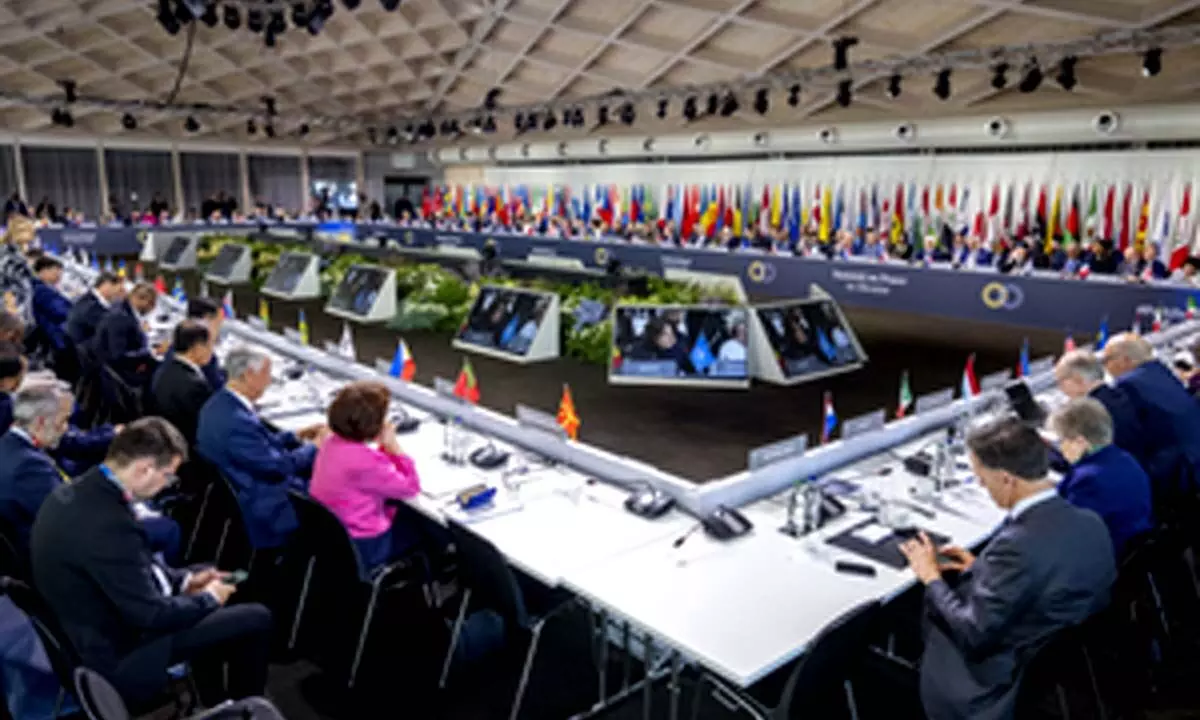Live
- A feast of music, dance and drama
- Mohan Babu denies absconding amid legal controversy
- Swift City to boost industrial growth in Bengaluru
- Allu Arjun walks out free after spending night in jail
- Congress harbours no grudge against any actor: TPCC chief
- Allu Arjun meets Upendra after release from prison, wishes for his ‘UI’ film
- Government Launches Uniform Diet Plan to Boost Student Health and Education
- Robust Security Arrangements for TSPSC Group-2 Exams in Jogulamba Gadwal
- National Lok Adalat Resolves 3387 Cases at Alampur Court
- ‘Get Set, Grow Summit 2024’ Focuses on Digital Detox for Families
Just In
Did the Ukrainian Peace Conference achieve what Zelensky or its organisers desired?

Ukrainian President Volodymyr Zelensky extolled the outcome of the peace conference in Switzerland - held without the presence of Russia, which was not invited - contending that all the participants at the summit, representing "the majority of the world"
New Delhi: Ukrainian President Volodymyr Zelensky extolled the outcome of the peace conference in Switzerland - held without the presence of Russia, which was not invited - contending that all the participants at the summit, representing "the majority of the world", have recognised his country's position.
How valid is his claim, even if the usual hyperbole is discounted?
It would seem that not much has been gained, given the two-day 'Summit on Peace in Ukraine' did not make much headway in either composition, substance, or even optics.
Admittedly, Russia's absence had virtually meant the conference would not even approach its objective, while the decision of China to stay away compounded this deficiency, and most countries of the Global South across Asia and Africa, which the organisers had sought to reach out to, were also conspicuous by their absence.
Of those who did attend, many like India, Brazil, South Africa, and Saudi Arabia did not even sign the final communique.
The attendance also laid out starkly the global divisions - of the 90 states and organisations present, 48 were European states or institutions, including Kosovo - listed as a country - and another six forming part of the Western bloc, like the US, Canada, and their Asian allies like Japan and South Korea. Out of these, 78 ended up signing the communique.
Of the post-Soviet states, only Georgia and Armenia, save Ukraine itself and three Baltic states, were present, and Armenia did not sign the communique.
While Latin and South America were well represented and most signed the communique, Mexico, Brazil, and Colombia did not.
From Africa, there were just 13 participants and while Benin, Cabo Verde, Comoros, Cote d'Ivoire, Gambia, Ghana, Kenya, Liberia, Rwanda, Sao Tome and Principe, and Somalia signed on, South Africa and Libya did not.
The Middle East was only represented by Saudi Arabia, Qatar, Jordan, and Iraq, and while Saudi Arabia and Jordan did not sign, the other two did, but Iraq later withdrew its signature.
The Asian presence was also sketchy, with India, Japan, South Korea, and Singapore joined by Indonesia, Thailand, the Philippines, and Timor Leste. Japan, South Korea, and Singapore were the only signatories.
Fiji and Palau were two signatories from the Pacific Ocean states, apart from Australia and New Zealand.
Even on the optics front, the summit did not meet its objectives.
The absence of US President Joe Biden, attending a Hollywood fundraiser, was a major blow and was vigorously attacked by a Ukrainian politician who termed all not coming as "lackeys of (Russian President Vladimir) Putin", though the comment was soon deleted.
Vice President Kamala Harris, leading the US delegation, addressed the conference on Saturday but left after only a few hours, returning to Washington before the summit’s main working day began.
German Chancellor Olaf Scholz skipped the second day of the conference, and French President Emmanuel Macron and Japanese Prime Minister Fumio Kishida were also reportedly among those who left the event after only a few hours.
And while Zelensky's statement was upbeat as usual, more sobering were the remarks of Saudi Arabian Foreign Minister, Prince Faisal bin Farhan Al Saud, who reiterated the kingdom’s commitment to “supporting all efforts at reaching an end” to the fighting between Moscow and Kiev, and said it "is essential to emphasise that any credible process will need Russia’s participation".
He also stressed that any meaningful progress "will require difficult compromise" between the parties.
The key phrase here was "difficult compromise" - which will not be palatable to Ukraine and the West's maximalist position.
Chancellor Scholz also acknowledged that the Ukraine conflict could not be resolved without Russia’s participation in talks.
“It is true that peace in Ukraine cannot be achieved without… Russia,” he said at the conference.
If there was any doubt left over the policy of isolating or ignoring Russia was working, Ukrainian Foreign Minister Dmitry Kuleba, addressing journalists on the final day of the summit, acknowledged that both sides to the conflict would have to hold negotiations at some juncture for definitive peace, though he hedged it by noting that Kiev needs to be in a stronger and advantageous position at that point in time.
“The idea is that the next summit should be the end of the war. And, of course, we need the other side at the negotiating table as well,” he said.
Ukraine understands “perfectly well that the moment will come when it will be necessary to talk to Russia", he said.
Realisation having sunk in is a creditable achievement, but it has to be seen how this will be realised given that there is no decision on any follow-up summit, nor has any country come forward for this.
Till then, the conflict and its consequences will continue.

© 2024 Hyderabad Media House Limited/The Hans India. All rights reserved. Powered by hocalwire.com






